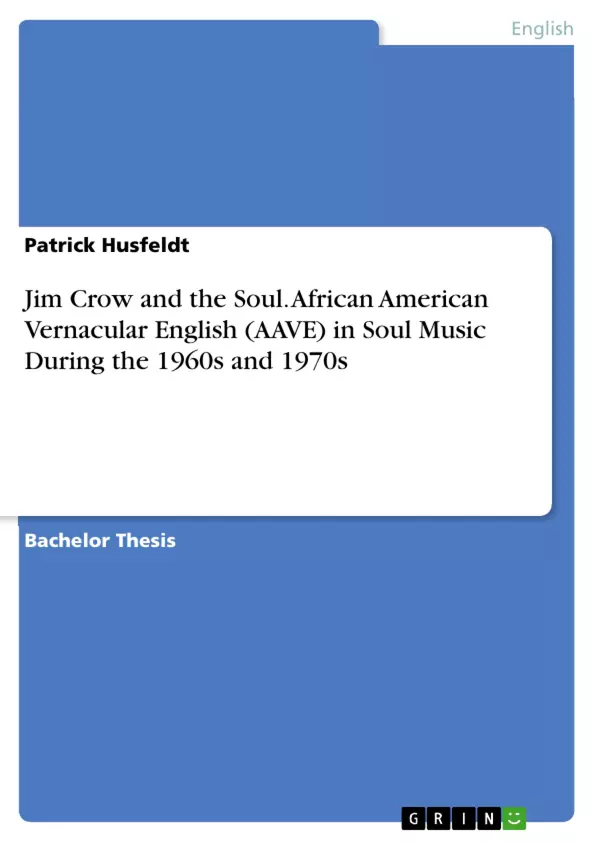The question that will be addressed in this thesis is whether dialect choice in soul music from Memphis and Detroit was, with regard to commercial success, stronger than the mostly homogeneous character of African American Vernacular English (AAVE) across all regions of the US.
A detailed linguistic analysis of a selection of songs from Motown and Stax will try to investigate the extent to which that artists from Detroit did adapt their language habits to their surrounding white fellow citizens. This might be even more interesting for northern blacks who moved away from their dialect roots in the South.
With respect to a separation from the white population, which can at least be assumed for the artists' childhood and early adulthood, it appears necessary to look at certain features that were either kept or lost. In addition, the analysis will try to connect the commercial success of all included songs and artists to the language habits of the performers.
First, some background for this paper's study will be provided, including the social implications of AAVE and the reference studies for the analysis. Then, the relevant phonological and grammatical variables will be listed and explained. These variables will be, with regard to the Motown and Stax data sets, analyzed in detail. Finally, the interpretation of the results will try to find an answer to the thesis of this paper.
Inhaltsverzeichnis (Table of Contents)
- Introduction
- Background to the study
- Social implications of AAVE
- Reference studies
- Phonology
- Grammatical Variables
- Analysis
- Remarks on selected artists/songs
- Motown
- Phonology
- Word-final consonant clusters
- Word-final single consonants
- Postvocalic /r/
- Glide weakening/monophthongization of /a1/
- DRESS/KIT merger
- Grammatical variables
- Multiple Negation
- Suffixal -s absence
- Zero Copula be
- Conclusion
- Phonology
- Stax Records
- Phonology
- Word-final consonant clusters
- Word-final single consonants
- Postvocalic /r/
- Glide weakening/monophthongization of /a1/
- DRESS/KIT merger
- Grammatical variables
- Multiple Negation
- Suffixal -s absence
- Zero copular be
- Conclusion
- Phonology
- Interpretation of the results
Zielsetzung und Themenschwerpunkte (Objectives and Key Themes)
This study examines the use of African American Vernacular English (AAVE) in soul music during the 1960s and 1970s, focusing on the influence of dialect on the genre’s development and its role in shaping black identity during a period of significant social and cultural change.
- The social implications of AAVE as a marker of black identity
- The influence of regional dialects, particularly Southern AAVE, on soul music
- The impact of language ideology on the commercial success of soul music
- The relationship between AAVE and the development of distinct subgenres of soul music, such as Motown and Stax
- The role of language choice in shaping the artistic and political expression of soul music
Zusammenfassung der Kapitel (Chapter Summaries)
The introduction explores the historical context of soul music, highlighting its origins in African American gospel music and its evolution as a form of social and cultural expression. It also introduces the concept of AAVE as a dialect with deep roots in black culture and its significance as a marker of identity.
Chapter 2 provides a detailed background on AAVE, examining its social implications and reviewing relevant research on its phonological and grammatical features. This chapter lays the groundwork for the analysis by establishing a theoretical framework for understanding the dialect and its impact on soul music.
Chapter 3 delves into the analysis of AAVE features in specific soul music recordings, focusing on the labels Motown and Stax Records. This chapter examines a range of phonological and grammatical features, exploring how they manifest in the speech of popular soul artists.
Schlüsselwörter (Keywords)
African American Vernacular English (AAVE), Soul Music, Black Identity, Language Ideology, Regional Dialects, Motown, Stax Records, Phonology, Grammar, Social Change.
Frequently Asked Questions
What is AAVE and why is it important in soul music?
African American Vernacular English (AAVE) is a distinct dialect with deep roots in black culture. In soul music, it serves as a powerful marker of black identity and artistic expression, especially during the social changes of the 1960s.
How did Motown and Stax Records differ in their use of AAVE?
The study analyzes whether artists from Motown (Detroit) adapted their language to a white audience more than artists from Stax (Memphis), who were closer to the Southern roots of the dialect.
Which linguistic features are analyzed in the songs?
The analysis focuses on phonological variables like postvocalic /r/ and word-final consonant clusters, as well as grammatical features like multiple negation and the "zero copula" (absence of 'be').
Did regional dialects influence the commercial success of soul artists?
The thesis investigates if choosing a specific dialect or "polishing" the language for a broader audience impacted the chart success and cultural reception of the music.
What is the "DRESS/KIT merger" mentioned in the study?
It is a phonological feature common in some AAVE varieties where the vowels in words like "pen" and "pin" are pronounced the same, reflecting regional linguistic heritage.
- Quote paper
- Patrick Husfeldt (Author), 2016, Jim Crow and the Soul. African American Vernacular English (AAVE) in Soul Music During the 1960s and 1970s, Munich, GRIN Verlag, https://www.grin.com/document/550889



